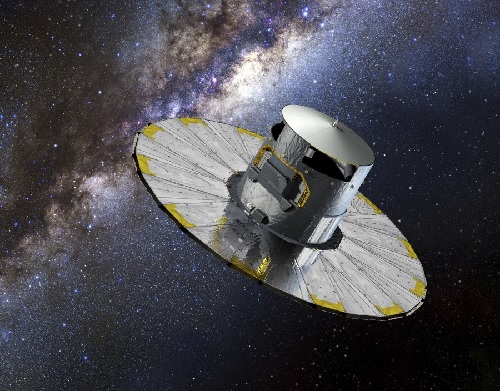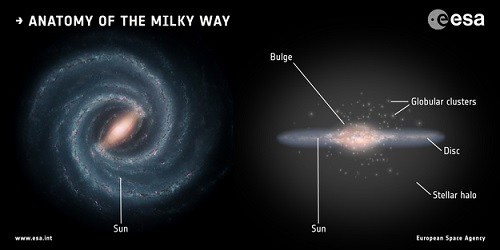Doldwaze Datadagen voor sterrenkundigen
De Bijenkorf is er mee gestopt, maar sterrenkundigen beginnen er juist mee: de doldwaze dagen, ongegeneerd graaien in een grote overvloed. Maar dan geen hemdjes of hebbedingetjes: het gaat om de helderheid en positie van een miljard sterren gemeten met de Gaia-satelliet. Die data worden woensdag 14 september openbaar gemaakt voor iedereen.

Normaal komen astronomische gegevens beetje bij beetje naar buiten. Eerst mogen degenen die hebben meebetaald aan de satelliet of telescoop er in grasduinen, daarna de rest van de astronomische wereld. ‘Maar Gaia is helemaal betaald door de Europese ruimtevaartorganisatie ESA’, legt RUG-sterrenkundige Amina Helmi uit. Omdat ESA ook met niet-Europese partners samenwerkt is besloten de gegevens in een keer voor iedereen toegankelijk te maken.
Dus woensdagmiddag om half een ’s middags (Nederlandse tijd) gaat het data-archief samen met enkele kopieën online. Iedere sterrenkundige kan vanaf dat moment gaan grasduinen in een terabyte aan gegevens. ‘Het is een deel van de meetgegevens van de eerste anderhalf jaar van de Gaia missie’, zegt Helmi. Zij maakte zelf met twee collega’s van het Kapteyn Instituut deel uit van een groep wetenschappers die de data van Gaia heeft gevalideerd: ‘We keken of de metingen kwalitatief voldoende waren.’
Interactief
Daarnaast ontwikkelde Maarten Breddels, een postdoc in haar groep, het softwarepakket Vaex om de gegevens in een sterrenkaart met een miljard sterren om te zetten. ‘Dit is bedoeld voor de analyse van ‘Big Data’. Je kunt hiermee binnen een seconde een miljard gegevens in een grafiek zetten en er dan interactief mee aan de slag gaan’, legt Helmi uit. ‘Het is bijzonder en vernieuwend en wellicht ook toepasbaar in andere vakgebieden.’ Ook dit pakket is open source, dus door iedereen te downloaden’.

Maar wordt het dan geen bloedbad, woensdag, wanneer iedereen als eerste de data wil gaan bestuderen? Helmi lacht. ‘Een beetje wel, maar ik denk dat het meevalt. Er zijn zoveel dingen die je kunt onderzoeken met deze gegevens, er is genoeg voor iedereen denk ik.’
Gaia meet met zeer grote nauwkeurigheid de helderheid, de positie en de beweging van een miljard sterren. Met die informatie is bijvoorbeeld te achterhalen hoe onze Melkweg is geëvolueerd, het onderzoeksthema van Helmi. ‘Nu heb ik dit soort gegevens van een veel kleiner aantal sterren, die bovendien dicht bij de zon staan. Het is alsof ik nu veel weet van een klein dorp, maar straks informatie krijg over de hele wereld.’ De gegevens van Gaia zijn bovendien ongeveer honderd keer nauwkeuriger dan alles wat nu beschikbaar is.
Wachten
Helmi is al zo’n twintig jaar betrokken bij Gaia. ‘Ik heb meegedacht over het ontwerp van de missie voordat deze in 2000 is goedgekeurd door de ESA.’ Daarna bleef ze betrokken bij de bouw van de satelliet, die uiteindelijk in 2013 is gelanceerd. Nu heeft ze dus de gegevens op kwaliteit mogen controleren. ‘We mochten ze nadrukkelijk nog niet wetenschappelijk onderzoeken. Daarmee moeten ook wij wachten tot woensdag.’

Hoe dat dan gaat? Haar groep, die acht personen telt, is al een tijdje bezig met de voorbereiding. ‘Wat wil je weten, hoe ga je dat meten in de Gaia data? Welke andere gegevens heb je hier bij nodig, welke software?’ Iedereen staat klaar om woensdag direct aan de slag te gaan. ‘Ik hoop donderdag al een paar vragen te kunnen beantwoorden. Maar de eerste publicaties, dat duurt wel een paar maanden.’
Woensdag moet ze bovendien eerst nog een praatje houden. ‘We zenden een live stream van de ESA uit over het openbaar maken van de gegevens. Als het zover is, zal ik kort iets zeggen.’ En daarna is het inloggen en werken? ‘We hebben als groep doorgaans op donderdag onze werkbespreking. Volgende week donderdag nemen we allemaal onze laptop mee.’
